Over 30 years of anarchist writing from Ireland listed under hundreds of topics
Gregor Kerr
The Twisted Road to Partnership: Can the trade union movement be saved from the bureaucracy?
As the trade union leadership does its best to drag us back into a new round of ‘social partnership’, Gregor Kerr – an activist in the Irish National Teachers Organisation – compares the best and worst of recent developments in the trade unions and poses a challenge – Can we save the movement by ridding it of the stultifying bureaucracy that seems set to strangle the life out of it?
The past number of months have witnessed the best and the worst of the trade union movement and its leadership. On the one hand, the presence of 5 trade unions – Unite, Mandate, CPSU, CWU and OPATSI – in the leadership of the Right2Water Campaign has certainly contributed to its being able to mobilise some of the biggest street mobilisations in the history of the state. But on the other hand the paucity of ambition and their perspective on how change in society is brought about, sees those unions and their leaderships doing their best to drag what has been largely a community-led campaign down the well-trodden and unlikely-to-succeed electoral path.
The Croke Park Agreement – the very antithesis of Larkin’s trade unionism
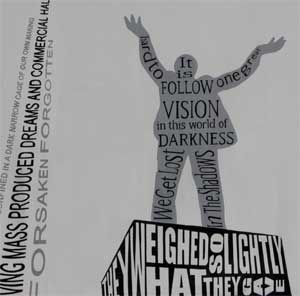 Next year, 2013, will mark the 100th anniversary of what many see as the most significant industrial dispute ever to have taken place in Ireland - the Dublin Lockout. The employers of Dublin, led by William Martin Murphy, locked out over 20,000 workers in an attempt to starve them into submission and to smash the increasingly popular Irish Transport and General Workers Union (ITGWU).
Next year, 2013, will mark the 100th anniversary of what many see as the most significant industrial dispute ever to have taken place in Ireland - the Dublin Lockout. The employers of Dublin, led by William Martin Murphy, locked out over 20,000 workers in an attempt to starve them into submission and to smash the increasingly popular Irish Transport and General Workers Union (ITGWU).
ICTU can't be trusted to organise a general strike
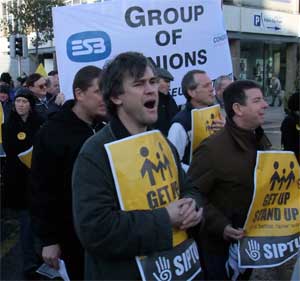 Tens of thousands will take part in today's ICTU demonstration in Dublin but the demonstration is seen by ICTU’s leaders as yet another one-off protest, another ‘letting-off-steam’ exercise, a trek around town from A to B to listen to speeches from the same people that have misled us to this position and then go home and get ready to vote for Labour in the forthcoming election. Far from ‘standing idly by’ they are actively working to demobilise opposition to the government. Against this we need to use today's protest as the starting point for the conversation about what we’re going to replace the current rotten mess with and as the first block in building for the general strike that we need to bring that about.
Tens of thousands will take part in today's ICTU demonstration in Dublin but the demonstration is seen by ICTU’s leaders as yet another one-off protest, another ‘letting-off-steam’ exercise, a trek around town from A to B to listen to speeches from the same people that have misled us to this position and then go home and get ready to vote for Labour in the forthcoming election. Far from ‘standing idly by’ they are actively working to demobilise opposition to the government. Against this we need to use today's protest as the starting point for the conversation about what we’re going to replace the current rotten mess with and as the first block in building for the general strike that we need to bring that about.
Making Cops Accountable - What Communities can do to organise resistance
The first thing I want to do is to commend the many people who have done sterling work to expose police corruption and unaccountability both in Ireland and elsewhere in recent years. In particular I want to commend the Wheelock family. One of the worst things that can happen any family is to lose a loved family member in circumstances such as the manner in which Terence was killed. To stand up to demand answers from the organs of the state is extremely difficult in such circumstances. To withstand harassment as a result to the extent that the Wheelock family have done compounds the difficulty. Wilting in the face of such harassment would be understandable. But that’s not going to happen. And that level of strength and courage is an example to all of us.
Direct Action Gets The Goods – But How?
Elsewhere in this magazine (see ‘Anarchism, Elections and all that’), the anarchist case against participation in elections is outlined. The alternative political strategy put forward by anarchists is the use of direct action. This article sets out to examine what is meant by the concept of direct action and also to argue that it is impossible to combine electoralism and direct action, that by its nature electoralism is disempowering, and that real direct action and participation in elections are mutually exclusive. Politics in Ireland and elsewhere is dominated by clientelism. People see themselves as needing politicians to “do stuff” for them. The politicians who are most successful are those who play the clientelist game most effectively. And left wing or socialist parties and candidates who decide to play the electoral game find themselves drawn into this clientelist game as well. This has huge implications in terms of how they approach campaigning work.
Privatisation – the rip-off of public resources
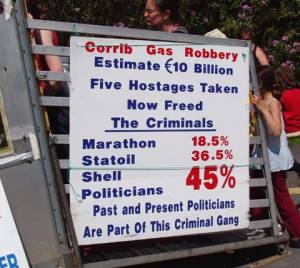 Throughout the world, public services have been under attack for the past twenty years. Forming a central plank of the capitalist globalisation agenda, ‘privatisation’ and ‘competition’ are the seemingly unchallenged dogma of modern capitalism. The levels of privatisation which have taken place worldwide are absolutely mindblowing. During the 1990s alone over $900 billion worth of public assets were transferred into private hands. Globally this agenda is pushed by the World Bank and the World Trade Organisation (WTO). The basic theory by which these bodies operate is that all decisions should be made on the basis of profitability alone.
Throughout the world, public services have been under attack for the past twenty years. Forming a central plank of the capitalist globalisation agenda, ‘privatisation’ and ‘competition’ are the seemingly unchallenged dogma of modern capitalism. The levels of privatisation which have taken place worldwide are absolutely mindblowing. During the 1990s alone over $900 billion worth of public assets were transferred into private hands. Globally this agenda is pushed by the World Bank and the World Trade Organisation (WTO). The basic theory by which these bodies operate is that all decisions should be made on the basis of profitability alone.
Where to Now? Anti-capitalist protest - global and local
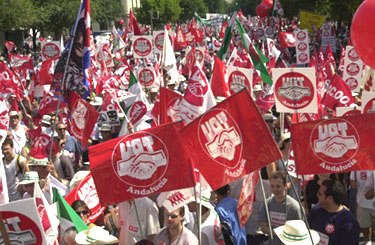 It is certainly hard to avoid the conclusion that anti-globalisation protests that avoid direct action will kill off the movement, or at least greatly reduce participation in it.
It is certainly hard to avoid the conclusion that anti-globalisation protests that avoid direct action will kill off the movement, or at least greatly reduce participation in it.
Debate on the effectiveness of the Black Bloc tactic could well go on forever. At the end of the day, in relation to the question of why its effectiveness has waned somewhat, it is probably true to say that both the original article by Ray Cunningham and the article in this magazine by Severino have some of the answers.
Crime, Punishment, and Community Policing
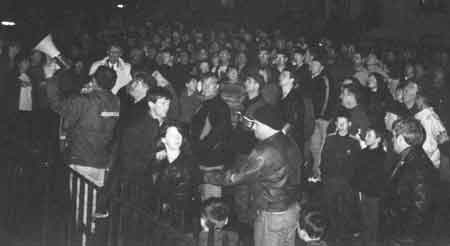 The term 'community policing' has been much abused in recent times, most particularly in the North of Ireland where it has become shorthand for vicious punishment beatings and shootings. In this article Gregor Kerr takes a look at the issue of community policing - what it is and more importantly what it isn't. The question of what levels of real community policing would actually be possible or allowed under capitalism is looked at, and the debate about crime, anti-social behaviour and reactions to it in an anarchist society is touched on. (pic: Anti-heroin dealer march, N. Inner city Dublin c1996 Photo Joe Black)
The term 'community policing' has been much abused in recent times, most particularly in the North of Ireland where it has become shorthand for vicious punishment beatings and shootings. In this article Gregor Kerr takes a look at the issue of community policing - what it is and more importantly what it isn't. The question of what levels of real community policing would actually be possible or allowed under capitalism is looked at, and the debate about crime, anti-social behaviour and reactions to it in an anarchist society is touched on. (pic: Anti-heroin dealer march, N. Inner city Dublin c1996 Photo Joe Black)
Crime, Punishment & Community policing
Anarchism and Elections
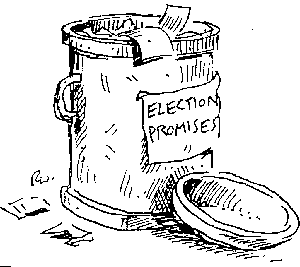
We are all used to the scenario. You don't see your local political 'representatives' for years and suddenly when an election is called they're all swarming all over your neighbourhood like flies around cowshit - the politicians and the wannabe politicians. It's a scene which is going to be enacted all over Ireland - both North and South - shortly as general elections loom on both sides of the border. Yet again we'll have the great choice between Tweedledum and Tweedledumber as to who we want to sit in Leinster House or Stormont for the next four or five years - even though we know that it's not really going to make any difference.
Hobson's choice : The "Good Friday Agreement" and the Irish Left
Until the Real IRA blasted the heart out of Omagh and its people, the Northern "peace process" appeared to be close to achieving the impossible. Loyalists and Republicans alike signing up to the "Good Friday Agreement", its acceptance by large majorities on both sides of the border, Gerry Adams and Ian Paisley sitting down in the same room as part of the new Assembly - it seemed as if what had appeared for decades to be impossible had been overtaken by the realpolitik of the pragmatic. All sides in the "conflict" - we were led to believe - were looking to a new beginning. Countless column inches in the popular press had been written eulogising the "statesmanship" of David Trimble and Seamus Mallon, the "peacemaking skills" of Tony Blair and Bertie Ahern and the "pragmatism" of Gerry Adams and David Ervine.

